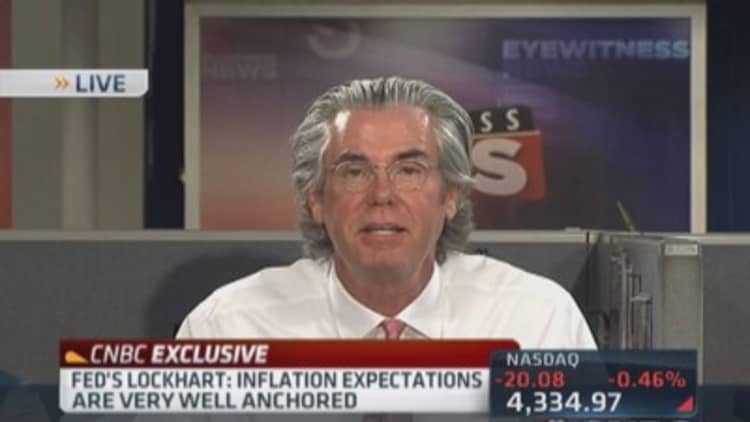Pimco's Paul McCulley believes the Federal Reserve has a direct desire to pump up the U.S. stock market, even if it won't acknowledge so explicitly.
Fed officials rarely mention stock prices in their public remarks, but McCulley thinks there's plenty of conversations behind the scenes, where central bankers are hoping that the soaring stock market eventually pays dividends to the much slower-moving economy.
In his latest monthly missive to investors, the firm's managing director and chief economist explains the strategy and its uncomfortable ramifications:
It is not a tasteful choice for the Fed at all. It reeks with social injustice. But it also happens to be the only viable choice: Use all available powers, with whatever-it-takes abandon, to reflate prices that are amenable to going up: long-term bonds and stocks.

The Fed, in fact, recently noted that most of the wealth gain has gone toward the higher echelon of earners. That's only natural in an economy that is growing at its slowest rate since the Great Depression but that also has seen a 200 percent explosion in the . Analysis has shown that the top 20 percent of earners own most of the stocks.
Read More
McCulley advises patience, though: Much like former Fed Chairman Ben Bernanke and current Chair Janet Yellen, he thinks a "wealth effect" eventually will be generated by the stock gains that will filter into the broader economy.
While he doesn't think stocks are in a bubble, he does see it as only natural that the market has exceeded normal valuations, which again may not necessarily be a bad thing:
Accordingly, getting out of a Liquidity Trap with monetary policy playing the lead role necessarily involves a Dornbuschian sequence of rational overshooting: The Fed must drive up Wall Street prices, which move quickly, so as to get to Main Street prices that move up slowly, most importantly, wages.
This sequencing implies that Wall Street's prices axiomatically will, in the short run, "overshoot" their long-term fair value, as the Fed appropriately and credibly commits to staying at the (zero lower-bound interest rate), until paper wealth creation endogenously deleverages private sector balance sheets sufficiently to restore animal-spirited risk taking on Main Street.
This sequencing implies that Wall Street prices must become very rich relative to Main Street prices in order to achieve so-called escape velocity from the Liquidity Trap. At the transition point, Wall Street prices will be rationally "overvalued" relative to their long-term "fair value."
The good news? The Fed is likely inclined to let "the recovery/expansion rip for a long time, fostering real wage gains for Main Street."
Read MoreConsumers snap wallets shut as income growth slows
The bad news? Eventually the financial markets will find an equilibrium where rates will stay low—part of Pimco's "New Natural" thesis on interest rates—in a process that will entail asset returns coming back to earth and staying there for an extended period of time.
This implies that the dominant risk for Wall Street is not bursting bubbles, but rather a long slow grind down in profit's share of (gross domestic product)/national income...
Bonds and stocks may at present be rationally valued, but borrowing from the lyrics of Procol Harum's Keith Reid: Expected long-term returns are turning a more ghostly whiter shade of pale.
Read More The stock gap: American stock holdings at 18-year low
—By CNBC's Jeff Cox






